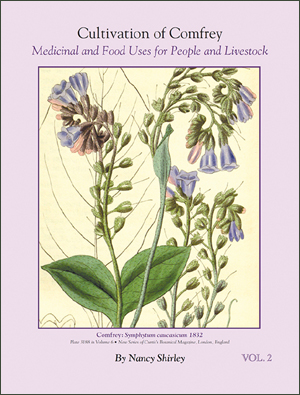How to Restore Vigor to Older Comfrey Plants
Comfrey
Book Volume 2, page 429 |

|
Older Comfrey
Plots and How to Restore Them
“The yield of Russian Comfrey increases steadily until it is between five and seven years old, but at ten years after planting it begins to go back, a decline that varies with the soil and manurial treatment. The main roots die of old age and rot off in black decay, while the growing points on the outsides spread into a kind of ‘fairy ring’ or ’moon crater’ of vigour, with a bare hollow in the middle. There is greater tendency to run to stem and flower.
After ten years, three-quarters of the area of each plant can be dug up, taking the circumference of the circles so that smaller clumps are left at reasonable intervals for cultivation.
The offsets (roots) from these will grow to full vigour when replanted on fresh land. The land is then well dunged and scuffled between the rows and plants, and with steady cutting the roots regain strength and the yield is restored.”
-Russian Comfrey: A Hundred Tons an Acre of Stock or Compost for Farm, Garden or Smallholding by Lawrence D. Hills. London England: Faber and Faber, Limited, 1953, page 73.
(A fairy ring, fairy circle or elf circle is a naturally occurring ring or arc in soil.)
(Scuffle is scraping or brushing the surface of the soil back and forth.)
|

|
Replant
Pieces of Comfrey Root
“As Comfrey plants age they die out in the middle, looking rather like coral atolls or moon craters. This is because instead of making a main tap root like a tree out of woody material, Comfrey grows soft ones like horse radish.
Only the layers immediately under the bark of a tree root take part in the two-way traffic of minerals and water and waste products. Tree roots stay alive with hemicellulose and lignins in long strong fibers.
Those of root vegetables have also a two-way traffic layer on the outside, but in the centre they have stored starches and proteins ready to provide energy and materials for the towering flower and seedhead. Comfrey roots come between the two.
The ‘crater effect’ on ageing Comfrey plants comes from the main roots wearing out and rotting off, just as the root hairs are dying and decaying in about 3 to 4 days.
The normal routine as the plot ages is to walk along the rows with a hand fork after the April or May cut, dig up any of the outer crater rim that has extended far enough to interfere with row crop cultivation, and replant the pieces in the empty middles, making sure the growing points are well below the surface.
The fungi which break down the worn-out roots do not attack living Comfrey.”
-Comfrey: Fodder, Food and Remedy by Lawrence D. Hills. New York: Rizzoli Universe Books: 1976, page 109.
(An atoll is a ring-shaped reef, island, or chain of islands.)
|

|
Transplanted
Comfrey Has Fresh, New Growth
“Old Comfrey plants gradually come to resemble moon craters or coral atolls in shape as the main roots die out from the middle and replacements grow outwards. How long this takes depends on the quality of the soil, but if the result is merely a fall in yield, take up some plants in March, and transplant the offsets in the hollow centres.”
-Fertility Gardening: The Organic Way to Make Your Garden Grow by Lawrence D. Hills. London, England: Cameron & Tayleur Books Limited, 1980.
|
 |
Buy Your
Comfrey Book, Volume 2
$27 with
free shipping
Your book
is sent by Media Mail through the Post Office.
Comfrey
Book, Vol 2: Complete Table of Contents pdf
|
|



